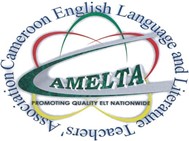|
CAMELTA stands for the Cameroon English Language and Literature Association that is a national umbrella for practitioners of the English language nationwide. Existing since 2001, CAMELTA was able to bring thousands of English language teachers on board ten regional vibrant chapters. In its missions feature In-service training for teachers, enhancing the quality of the English taught both to French and English speakers, capacity building and empowerment of younger ones in the teaching field, professional development tips for all practitioners, etc.
 CAMELTA has come a long way with its joys and drawbacks. A glorious past with 14 annual pedagogic conferences held, gathering a minimum of 300 participants from all regions of Cameroon from 3 to 5 days. A coming together that no English teacher would want to miss. Then came the political crisis in the English-speaking regions of Cameroon and two of our most vibrant chapters could no longer meet nor organize crowd events. In solidarity, the national body had to suspend the national pedagogic annual congresses for a while. Nevertheless, CAMELTA activities within other regions went on till the COVID lockdown came in with a lot of misery. CAMELTA looked for ways to bounce back and continue to assist teachers, especially those in rural and remote areas. CAMELTA has come a long way with its joys and drawbacks. A glorious past with 14 annual pedagogic conferences held, gathering a minimum of 300 participants from all regions of Cameroon from 3 to 5 days. A coming together that no English teacher would want to miss. Then came the political crisis in the English-speaking regions of Cameroon and two of our most vibrant chapters could no longer meet nor organize crowd events. In solidarity, the national body had to suspend the national pedagogic annual congresses for a while. Nevertheless, CAMELTA activities within other regions went on till the COVID lockdown came in with a lot of misery. CAMELTA looked for ways to bounce back and continue to assist teachers, especially those in rural and remote areas.
CAMELTA had to go digital and use new tools at hand for distance learning, using social media to set, run and manage COPs (communities of practitioners). One of the most important challenges was to train teachers in using ICTs and social media Apps for continuous capacity building of its teachers. CAMELTA ran a professional development project via mobile COPs training workshops. The regional workshops focused on the following topics: Running COPs for teachers’ professional development; using mobiles phones for TPD; developing leadership skills in an ELTA; running an ELTA.
As follow-up activities, CAMELTA encouraged and witnessed the creation of WhatsApp groups for English teachers’ professional development. Pedagogic supervisors welcomed that training as it enabled them to create groups involving teachers in their pedagogic pools and areas of competency, making their work easy and limiting their moving physically to remote and rural areas. Some of the groups are very active today and involve hundreds of teachers. We can name the CAMELTA CHAT group, the CAMELTA EFL ability group, the CAMELTA Virtual Award Group, and the Camelta Research group.
CAMELTA is grateful to two dedicated facilitators, Dr. Harry Kuchah and Dr. Ekembe Eric, who set up a CAMELTA Research Group to introduce young teachers to action research, boost their creativity, and monitor their output. They have organized many activities and shared best practices from their classrooms. They have also launched webinars for teachers and put together a Sub-Sahara African Teacher research Conference in August 2021. CAMELTA members expect more and CAMELTA strives to follow all new trends in ELT.
Catherine MOTO ZEH, CAMELTA National PRESIDENT
Biodata
Mrs. MOTO ZEH, an old hand English language teacher to French-speaking learners. Pedagogic adviser, she has been working as a Regional Inspector Coordinator in charge of Teaching and Promotion of Bilingualism in the Ministry of Secondary Education, Cameroon, heading a college of 30 pedagogic inspectors. She is the National President of CAMELTA (Cameroon English Language and Literature Teachers’ Association). | 
